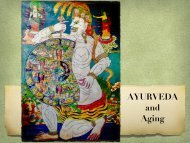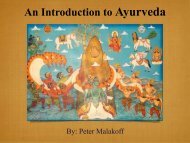How Thoreau's Walden Pond Mixed with the Ganges and Yoga Came to America with Swami Vivekananda
One early morning in 1846, during the coldest days of a New England winter, Henry David Thoreau looked out the window of his small cabin on Walden Pond and saw men cutting its ice into blocks. That ice was hauled by horse to a railroad that ran across the western edge of Walden Pond, packed into a boxcar, taken to Boston and loaded onto a clipper ship that sailed to Calcutta, India, arriving about four months later. Once there, that ice was purchased by grateful members of the East India Company. Thoreau had witnessed a small part of the global ice trade between New England and India that took place during the latter part of the nineteenth century. When Thoreau considered the ice trade, his vision sailed on metaphors far beyond the scope of business. The waters he imagined flowed both east and west and carried not just natural elements, but culture, religion and philosophy as well. He envisioned that after arriving in Calcutta, the New England ice of Walden Pond would eventually melt and run downhill where it would join with the sacred water of the Ganges. He wrote in Walden: "It appears that the sweltering inhabitants of Charleston and New Orleans, of Madras and Bombay and , drink at my well. In the morning I bathe my intellect in the stupendous and cosmogonal philosophy of the , since whose composition years of the gods have elapsed, and in comparison with which our modern world and its literature seem puny and trivial; and I doubt if that philosophy is not to be referred to a previous state of existence, so remote is its sublimity from our conceptions. I lay down the book [Bhagavad-Gita] and go to my well for water, and lo! there I meet the servant of the Bramin, priest of and and who still sits in his temple on the Ganges reading the , or dwells at the root of a tree with his crust and water jug. I meet his servant come to draw water for his master, and our buckets as it were grate together in the same well. The pure Walden water is mingled with the sacred water of the Ganges." This book tells the story of these waters . . .
One early morning in 1846, during the coldest days of a New England winter, Henry David Thoreau looked out the window of his small cabin on Walden Pond and saw men cutting its ice into blocks. That ice was hauled by horse to a railroad that ran across the western edge of Walden Pond, packed into a boxcar, taken to Boston and loaded onto a clipper ship that sailed to Calcutta, India, arriving about four months later. Once there, that ice was purchased by grateful members of the East India Company. Thoreau had witnessed a small part of the global ice trade between New England and India that took place during the latter part of the nineteenth century.
When Thoreau considered the ice trade, his vision sailed on metaphors far beyond the scope of business. The waters he imagined flowed both east and west and carried not just natural elements, but culture, religion and philosophy as well. He envisioned that after arriving in Calcutta, the New England ice of Walden Pond would eventually melt and run downhill where it would join with the sacred water of the Ganges. He wrote in Walden: "It appears that the sweltering inhabitants of Charleston and New Orleans, of Madras and Bombay and , drink at my well. In the morning I bathe my intellect in the stupendous and cosmogonal philosophy of the , since whose composition years of the gods have elapsed, and in comparison with which our modern world and its literature seem puny and trivial; and I doubt if that philosophy is not to be referred to a previous state of existence, so remote is its sublimity from our conceptions.
I lay down the book [Bhagavad-Gita] and go to my well for water, and lo! there I meet the servant of the Bramin, priest of and and who still sits in his temple on the Ganges reading the , or dwells at the root of a tree with his crust and water jug. I meet his servant come to draw water for his master, and our buckets as it were grate together in the same well. The pure Walden water is mingled with the sacred water of the Ganges."
This book tells the story of these waters . . .
Create successful ePaper yourself
Turn your PDF publications into a flip-book with our unique Google optimized e-Paper software.
Ramana Maharshi<br />
"Ramana Maharshi (1879–1950) is<br />
widely acknowledged as one of <strong>the</strong><br />
outst<strong>and</strong>ing Indian gurus of modern<br />
times. He was born as Venkataraman<br />
Iyer, in Tiruchuli, Tamil<br />
Nadu (South India).<br />
At <strong>the</strong> age of sixteen, Venkataraman<br />
lost his sense of individual selfhood,<br />
an awakening which he later<br />
recognized as enlightenment. A few<br />
weeks <strong>the</strong>reafter he traveled <strong>to</strong> <strong>the</strong><br />
holy mountain Arunachala, at Tiruvannamalai,<br />
where he remained for<br />
<strong>the</strong> rest of his life.<br />
His first years were spent in solitude, but his stillness <strong>and</strong> his appearance as a<br />
sannyasin soon attracted devotees. In later years, he responded <strong>to</strong> questions, but<br />
always insisted that silence was <strong>the</strong> purest teaching. His verbal teachings flowed<br />
from his own underst<strong>and</strong>ing of Reality. In later years, a community grew up<br />
around him, where he was available twenty-four hours a day <strong>to</strong> visi<strong>to</strong>rs. Though<br />
worshipped by thous<strong>and</strong>s, he never allowed anyone <strong>to</strong> treat him as special, or receive<br />
private gifts. He treated all <strong>with</strong> equal respect. Since <strong>the</strong> 1930s, his teachings<br />
have also been popularized in <strong>the</strong> west.<br />
Venkataraman was renamed Bhagavan Sri Ramana Maharshi by one of his<br />
earliest followers, Ganapati Muni. This was <strong>the</strong> name he became known by <strong>to</strong><br />
<strong>the</strong> world.<br />
In response <strong>to</strong> questions on self-liberation <strong>and</strong> <strong>the</strong> classic texts on <strong>Yoga</strong> <strong>and</strong><br />
Vedanta, Ramana recommended self-enquiry as <strong>the</strong> principal way <strong>to</strong> awaken <strong>to</strong><br />
<strong>the</strong> "I-I,” realizing <strong>the</strong> Self <strong>and</strong> attaining liberation. He also recommended<br />
Bhakti, <strong>and</strong> gave his approval <strong>to</strong> a variety of paths <strong>and</strong> practices.”<br />
– Ramakrishna Math <strong>and</strong> Ramakrishna Mission<br />
Below is Ramana Maharishi’s s<strong>to</strong>ry of his enlightenment:<br />
“It was in 1896, about 6 weeks before I left Madurai for good (<strong>to</strong> go <strong>to</strong><br />
Tiruvannamalai-Arunachala) that this great change in my life <strong>to</strong>ok place. I was<br />
sitting alone in a room on <strong>the</strong> first floor of my uncle's house. I seldom had any<br />
sickness <strong>and</strong> on that day <strong>the</strong>re was nothing wrong <strong>with</strong> my health, but a sudden<br />
violent fear of death over<strong>to</strong>ok me. There was nothing in my state of health <strong>to</strong> account<br />
for it nor was <strong>the</strong>re any urge in me <strong>to</strong> find out whe<strong>the</strong>r <strong>the</strong>re was any account<br />
for <strong>the</strong> fear. I just felt I was going <strong>to</strong> die <strong>and</strong> began thinking what <strong>to</strong> do<br />
about it. It did not occur <strong>to</strong> me <strong>to</strong> consult a doc<strong>to</strong>r or any elders or friends. I felt<br />
I had <strong>to</strong> solve <strong>the</strong> problem myself <strong>the</strong>n <strong>and</strong> <strong>the</strong>re. The shock of <strong>the</strong> fear of death<br />
drove my mind inwards <strong>and</strong> I said <strong>to</strong> myself mentally, <strong>with</strong>out actually framing<br />
<strong>the</strong> words: 'Now death has come; what does it mean? What is it that is dying?<br />
This body dies.' And at once I dramatized <strong>the</strong> occurrence of death. I lay <strong>with</strong><br />
my limbs stretched out still as though rigor mortis has set in, <strong>and</strong> imitated a<br />
corpse so as <strong>to</strong> give greater reality <strong>to</strong> <strong>the</strong> enquiry. I held my breath <strong>and</strong> kept my<br />
lips tightly closed so that no sound could escape, <strong>and</strong> that nei<strong>the</strong>r <strong>the</strong> word 'I'<br />
nor any word could be uttered. 'Well <strong>the</strong>n,' I said <strong>to</strong> myself, 'this body is dead. It<br />
will be carried stiff <strong>to</strong> <strong>the</strong> burning ground <strong>and</strong> <strong>the</strong>re burnt <strong>and</strong> reduced <strong>to</strong> ashes.<br />
But <strong>with</strong> <strong>the</strong> death of <strong>the</strong> body, am I dead? Is <strong>the</strong> body I? It is silent <strong>and</strong> inert,<br />
but I feel <strong>the</strong> full force of my personality <strong>and</strong> even <strong>the</strong> voice of I <strong>with</strong>in me,<br />
apart from it. So I am <strong>the</strong> Spirit transcending <strong>the</strong> body. The body dies but <strong>the</strong><br />
spirit transcending it cannot be <strong>to</strong>uched by death. That means I am <strong>the</strong> deathless<br />
Spirit.' All this was not dull thought; it flashed through me vividly as living<br />
truths which I perceived directly almost <strong>with</strong>out thought process. I was something<br />
real, <strong>the</strong> only real thing about my present state, <strong>and</strong> all <strong>the</strong> conscious activity<br />
connected <strong>with</strong> <strong>the</strong> body was centered on that I. From that moment onwards,<br />
<strong>the</strong> "I" or Self focused attention on itself by a powerful fascination. Fear of<br />
death vanished once <strong>and</strong> for all. The ego was lost in <strong>the</strong> flood of Self-awareness.<br />
Absorption in <strong>the</strong> Self continued unbroken from that time. O<strong>the</strong>r thought might<br />
come <strong>and</strong> go like <strong>the</strong> various notes of music, but <strong>the</strong> I continued like <strong>the</strong> fundamental<br />
sruti note ["that which is heard" i.e. <strong>the</strong> Vedas <strong>and</strong> Upanishads] a note<br />
which underlies <strong>and</strong> blends <strong>with</strong> all o<strong>the</strong>r notes."<br />
Related Glossary Terms<br />
Sages, Samadhi<br />
Index<br />
Find Term


















